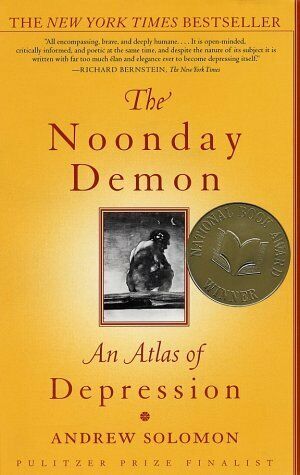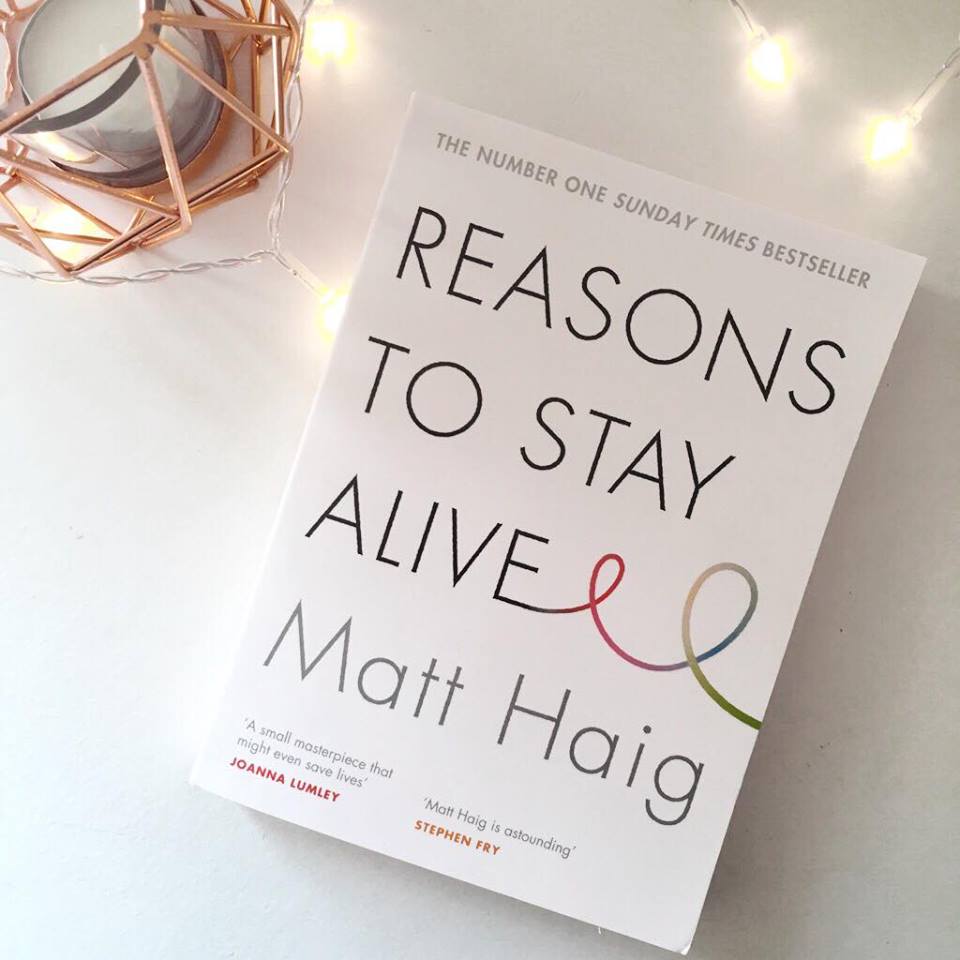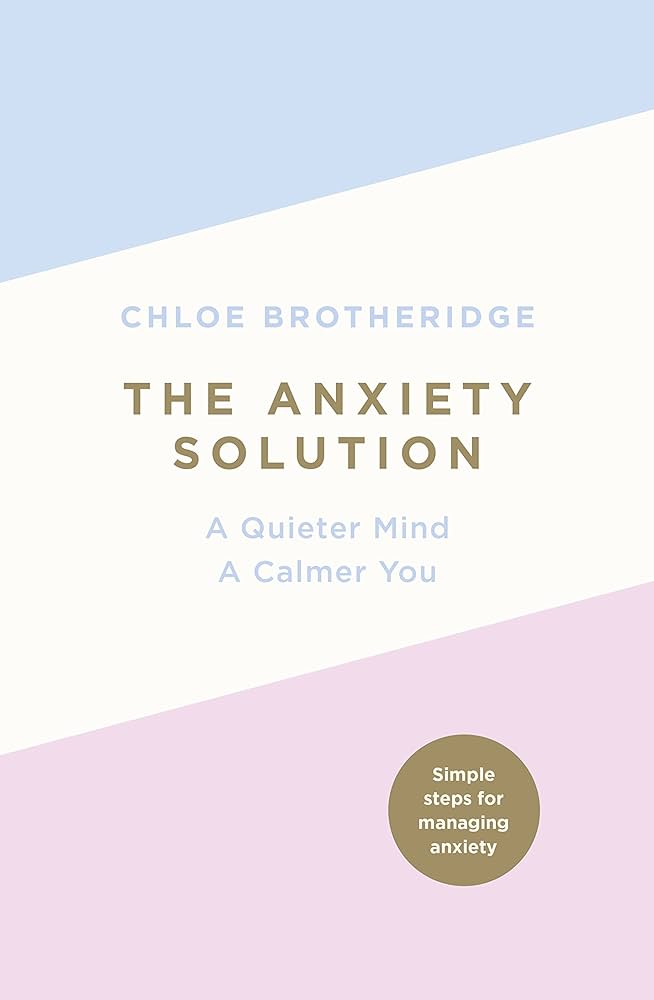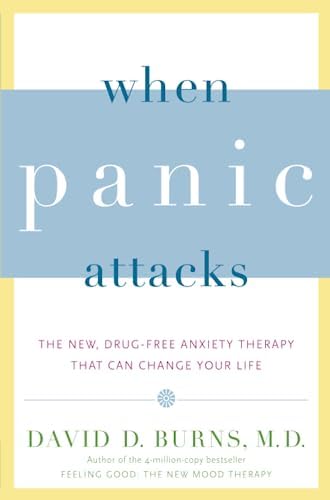
Best mental health books: “The Noonday Demon: An Atlas of Depression” by Andrew Solomon
Overview: “The Noonday Demon” by Andrew Solomon stands as a seminal work in the exploration of depression, intertwining the personal and the universal. Solomon, through his own intimate struggles and a vast canvas of research, crafts an atlas that navigates the complexities of depression with depth and nuance.
Andrew Solomon’s Personal Narrative: Solomon courageously bares his own journey with depression, adding a deeply personal layer to the narrative. His firsthand account becomes a powerful testament, resonating with readers who may find solace and understanding in the shared experience.
Holistic Exploration of Depression: What sets “The Noonday Demon” apart is its comprehensive examination of depression. Solomon doesn’t merely scratch the surface; he delves into the biological, psychological, and societal dimensions of this often misunderstood condition. The book becomes a guide, offering insights into the diverse manifestations of depression.
Interweaving Research and Narrative: Solomon’s ability to seamlessly weave personal narrative with extensive research is a hallmark of this book. Readers are taken on a journey that is both informative and emotionally resonant, providing a multifaceted understanding of depression.
Impact and Recognition: The Pulitzer Prize awarded to “The Noonday Demon” reflects its significance in the literary and mental health spheres. Its impact extends beyond the pages, contributing to broader conversations about mental health awareness and challenging societal stigmas.
Relevance Today: Despite being written years ago, the relevance of “The Noonday Demon” persists. Its insights into the nature of depression remain a guiding light for individuals, caregivers, and mental health professionals, making it a timeless resource in the understanding of mental health.
Navigating the depths of depression, Andrew Solomon’s “The Noonday Demon” emerges as a beacon of insight and understanding. From personal narratives to comprehensive research, this book continues to shape conversations around mental health, earning both critical acclaim and a lasting impact. Explore the profound depths of depression with Solomon as your guide, and discover a richer, more empathetic understanding of this complex condition.

Best mental health books: “Reasons to Stay Alive” by Matt Haig
Overview: “Reasons to Stay Alive” by Matt Haig is a compelling narrative that transcends the boundaries of traditional memoirs. Haig, with raw authenticity and poetic prose, weaves a tapestry of personal struggle and triumph, creating not just a book but a lifeline for those navigating the tumultuous seas of depression.
Matt Haig’s Personal Odyssey: At the heart of the book is Haig’s personal odyssey through the shadows of depression. His narrative doesn’t merely recount; it immerses readers in the depths of his emotions, making vulnerability an instrument of connection. Through the highs and lows, Haig invites readers to not just witness but partake in the journey.
Philosophical Reflections on Life: “Reasons to Stay Alive” goes beyond a chronological account of struggles. Haig intersperses philosophical reflections on life, mental health, and the human condition. These interludes elevate the book, offering readers not just a glimpse into one man’s experience but a contemplative space to ponder their own existence.
Hope Amidst Darkness: True to its title, the book is a beacon of hope in the darkest of times. Haig doesn’t just share the bleakness of his depression; he meticulously carves out reasons to stay alive. This deliberate focus on hope, resilience, and the small joys of life transforms the book into a guide for survival.
Impact on Mental Health Discourse: “Reasons to Stay Alive” has resonated profoundly, not just with individuals grappling with mental health issues but with a broader readership. Its impact extends beyond the personal, influencing conversations about mental health on societal and cultural levels. Haig’s work has become a rallying cry for destigmatizing mental health struggles.
Continued Relevance: In a landscape where discussions about mental health are ever-evolving, “Reasons to Stay Alive” maintains its relevance. It’s universal themes and poignant prose ensure that irrespective of the reader’s own struggles, the book serves as a timeless reminder of the power of resilience and the significance of finding reasons to embrace life.
Matt Haig’s “Reasons to Stay Alive” transcends the boundaries of a memoir. It is a testament to the human spirit’s resilience, a philosophical exploration, and a beacon of hope. Dive into the depths of Haig’s journey, and emerge with a renewed perspective on life, mental health, and the profound reasons that make survival not just possible but meaningful.

Best mental health books: “Lost Connections” by Johann Hari
Overview: Johann Hari’s “Lost Connections” is a groundbreaking exploration of depression and anxiety that challenges conventional narratives. Through a captivating blend of personal stories and in-depth research, Hari unravels the societal threads contributing to the fabric of mental health struggles, urging readers to rethink their understanding of these pervasive conditions.
Journey Through Societal Factors: What sets “Lost Connections” apart is its journey beyond the individual to the societal. Hari delves into the impact of disconnection in modern life, examining factors such as loneliness, disconnection from meaningful work, and the role of cultural norms. This societal lens adds a crucial layer to the understanding of mental health.
Humanizing Data with Personal Narratives: Hari humanizes data. Statistics are not just numbers but stories, making the book accessible even to those unfamiliar with academic discussions. By interweaving personal narratives with research findings, Hari creates a narrative that resonates emotionally while remaining intellectually rigorous.
Call to Action for Change: The book is not merely an observation; it’s a call to action. Hari proposes societal changes, challenging the status quo in how we approach mental health. From the way we view antidepressants to reimagining the structure of our communities, “Lost Connections” urges us to rethink and rebuild systems for better mental well-being.
Impact on Mental Health Discourse: “Lost Connections” has sparked conversations far beyond individual struggles, influencing how we collectively perceive and address mental health. By placing mental health within the context of broader societal issues, Hari’s work has been instrumental in reshaping public discourse and policy discussions.
Ongoing Impact: The impact of “Lost Connections” endures, resonating with readers and professionals alike. As mental health continues to be a global concern, the book serves as a guidepost for those seeking a more holistic understanding and approach. Its relevance only amplifies in a world where the ties between mental health and societal structures are more evident than ever.
Johann Hari’s “Lost Connections” transcends the individual narrative, delving into the societal roots of mental health struggles. It’s a call to action, challenging us to rethink our approach to mental well-being. Join Hari on a journey that goes beyond symptoms, into the very fabric of our interconnected existence, and discover a profound reconnection with the discourse of mental health.

Best mental health books: “The Anxiety Solution” by Chloe Brotheridge
Overview: Chloe Brotheridge’s “The Anxiety Solution” is a practical guide that goes beyond acknowledging anxiety to providing actionable strategies for its management. Rooted in Brotheridge’s expertise as a hypnotherapist, the book equips readers with a toolkit for navigating the complexities of anxiety in a practical and empowering way.
Practical Strategies for Anxiety Management: At the core of “The Anxiety Solution” are tangible strategies for managing anxiety. Brotheridge draws from her professional background, offering practical tools rooted in hypnotherapy, mindfulness, and cognitive-behavioral approaches. The book becomes a hands-on guide, empowering readers to actively participate in their mental well-being.
Holistic Approach to Well-being: What distinguishes this book is its holistic approach. It doesn’t just tackle anxiety as a singular issue but addresses the interconnected aspects of well-being. From nutrition to self-care practices, Brotheridge weaves together a comprehensive approach, recognizing that mental health is a tapestry woven from various threads.
Accessible Language and Tone: Brotheridge employs an accessible language and a conversational tone, making the book approachable for a broad audience. Anxiety, often overwhelming in its complexity, is broken down into manageable components, and readers are guided through each step with empathy and clarity.
Empowering Readers: Beyond offering strategies, “The Anxiety Solution” empowers readers. By providing tools and knowledge, Brotheridge enables individuals to reclaim agency over their mental health. The book is not a passive read but an active engagement, encouraging readers to implement changes and witness the transformative power of their actions.
Positive Impact on Readers: The impact of “The Anxiety Solution” extends beyond the reading experience. Testimonials and reviews attest to its efficacy in the real lives of individuals dealing with anxiety. Brotheridge’s work is not just theoretical; it is a practical guide that has positively influenced the daily lives of its readers.
Chloe Brotheridge’s “The Anxiety Solution” is more than a book; it’s a toolkit for actively managing anxiety. Rooted in practical strategies and delivered in an accessible tone, this book is a companion for those navigating the complex terrain of anxiety. Dive into Brotheridge’s expertise, and discover a path to empowerment in the face of anxiety.

Best mental health books: “When Panic Attacks” by David D. Burns
Overview: “When Panic Attacks” by David D. Burns is a beacon of light for those grappling with anxiety and panic disorders. Burns, a renowned psychiatrist, offers a comprehensive guide that not only demystifies panic attacks but provides practical cognitive-behavioral techniques for overcoming them.
Cognitive-Behavioral Techniques: At the heart of the book are cognitive-behavioral techniques that empower individuals to confront and conquer panic attacks. Burns introduces readers to practical tools that reshape thought patterns and behaviors, offering a roadmap to navigate the often overwhelming experience of panic.
Understanding the Roots of Anxiety: Burns doesn’t just provide strategies; he delves into the roots of anxiety. By unraveling the psychological underpinnings of panic attacks, the book equips readers with a deeper understanding of their condition. This knowledge becomes a potent weapon in the journey toward long-term anxiety management.
Interactive Exercises for Readers: “What Panic Attacks” is not a passive read; it’s an interactive experience. Burns incorporates exercises that encourage readers to actively engage with the material. From journaling to self-reflection, these exercises become stepping stones toward a more profound self-awareness and mastery over anxiety.
Real-Life Success Stories: The book is enriched with real-life success stories. Burns shares anecdotes of individuals who have successfully overcome panic attacks using the techniques outlined in the book. These stories serve as beacons of hope, illustrating that recovery from anxiety is not just possible but achievable through dedicated effort.
Professional Expertise Made Accessible: Burns, with his wealth of professional expertise, distills complex psychological concepts into accessible language. This accessibility makes the book valuable not only for individuals experiencing panic attacks but also for a broader readership seeking to understand and support those on this mental health journey.
David D. Burns’s “When Panic Attacks” is a guide from a seasoned psychiatrist, offering practical strategies for conquering anxiety. From cognitive-behavioral techniques to real-life success stories, this book is a valuable resource for those navigating the challenging terrain of panic attacks. Immerse yourself in Burns’s expertise, and discover a path to reclaiming control over anxiety.
Conclusion: Navigating the Landscape of Mental Health Through Literature
In this exploration of the best mental health books, we’ve journeyed through narratives of depression, societal reflections on mental health, practical guides for anxiety management, and tools for conquering panic attacks. Each book serves as a unique lantern, illuminating different facets of the complex landscape of mental health.
Andrew Solomon’s “The Noonday Demon” invites readers into the personal and societal dimensions of depression, while Matt Haig’s “Reasons to Stay Alive” intertwines personal odyssey with philosophical reflections on life. Johann Hari’s “Lost Connections” challenges us to rethink the societal factors influencing mental health, Chloe Brotheridge’s “The Anxiety Solution” provides a practical toolkit for anxiety management, and David D. Burns’s “When Panic Attacks” equips readers with cognitive-behavioral techniques to conquer panic.
These best mental health books not only contribute to personal understanding but also reshape societal conversations about mental health. They offer hope, practical guidance, and a deeper awareness of the interconnected threads that weave our mental well-being.
As we continue to navigate the vast landscape of mental health, may these books be companions, guides, and sources of inspiration for those seeking understanding, support, and empowerment. Let literature be a bridge, connecting us to the diverse and resilient tapestry of the human mind.
Embark on a literary journey through the landscape of mental health. From personal narratives to societal reflections, practical guides to conquering anxiety and panic attacks, these impactful books illuminate the complexities of the human mind. As beacons of understanding and resilience, they shape not only personal narratives but also the broader discourse surrounding mental health. Discover the transformative power of literature in navigating the intricate terrain of mental well-being.
